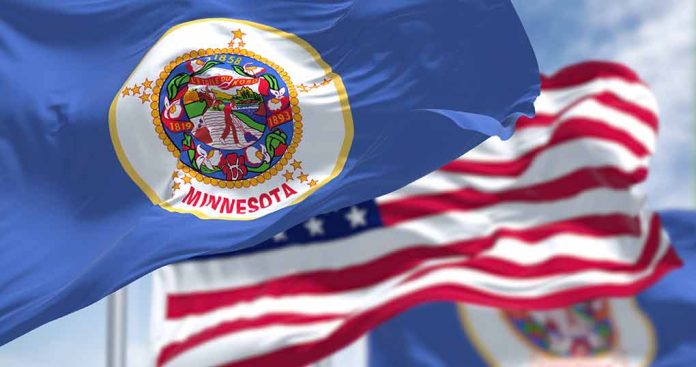
Minnesota Governor Tim Walz ignited a firestorm by comparing Immigration and Customs Enforcement (ICE) to the Nazi Gestapo, drawing immediate condemnation from Trump administration officials and sparking intense debate about immigration enforcement rhetoric.
Key Takeaways
- Governor Tim Walz’s comparison of ICE to the Gestapo has sparked national outrage among conservatives and ICE supporters
- Department of Homeland Security reports ICE officers now face a 413% increase in assaults following inflammatory rhetoric
- Critics argue the comparison distorts history, endangers law enforcement, and undermines legitimate immigration enforcement
- The controversy highlights the growing divide in America over immigration policy and enforcement
- Trump administration officials strongly defend ICE as a legitimate law enforcement agency operating under proper legal authority
Walz’s Inflammatory Rhetoric Sparks National Backlash
Minnesota Governor Tim Walz has found himself at the center of a national controversy after making comments comparing U.S. Immigration and Customs Enforcement (ICE) agents to the Gestapo, Nazi Germany’s secret police force known for its brutal tactics. The comparison, which came during a speech addressing immigration policy, has drawn sharp criticism from conservatives, ICE supporters, and Trump administration officials who view the statement as not only false but dangerous to law enforcement personnel tasked with enforcing America’s immigration laws.
“It is absolutely sickening to compare ICE law enforcement agents to the Gestapo. Attacks and demonization of ICE and our partners is wrong. ICE officers are now facing a 413% increase in assaults,” said Department of Homeland Security
Dangerous Consequences for Law Enforcement
The Department of Homeland Security’s statement highlights a disturbing trend: violent attacks against ICE officers have skyrocketed by 413% as rhetoric comparing them to Nazi forces has spread. This alarming statistic underscores the real-world consequences of political hyperbole. ICE agents, who are tasked with enforcing existing immigration laws passed by Congress, now face increased personal danger while performing their duties. Many conservative lawmakers have pointed out that regardless of one’s views on immigration policy, targeting law enforcement officers with such inflammatory comparisons crosses a dangerous line.
Critics of Walz’s statement argue that comparing a legitimate American law enforcement agency to the Nazi Gestapo – an organization responsible for countless atrocities during the Holocaust – trivializes historical suffering while simultaneously endangering American public servants. Republican lawmakers have called for an immediate apology from the governor, noting that ICE operates under strict legal parameters and constitutional oversight, unlike the Gestapo which operated outside any legitimate legal framework and committed horrific human rights abuses.
The Reality of Immigration Enforcement
Homeland Security officials have pushed back forcefully against Walz’s characterization, emphasizing that ICE operates within strict legal boundaries and judicial oversight. Unlike the Gestapo, which operated as a tool of terror and genocide, ICE functions as a law enforcement agency tasked with upholding immigration laws democratically enacted by Congress. The agency primarily targets individuals who have violated U.S. immigration laws, particularly those with criminal records or who pose threats to public safety – a far cry from the indiscriminate persecution conducted by the Nazi secret police.
The controversy highlights a broader pattern of rhetorical escalation from left-wing politicians regarding immigration enforcement. Rather than proposing specific policy reforms or engaging in substantive debate about immigration law, critics suggest that many Democrats have resorted to demonizing the enforcement agencies themselves. This approach not only endangers law enforcement personnel but fails to address the underlying policy questions at stake in America’s ongoing immigration debate.
Political Motivations Behind the Rhetoric
Many conservative commentators view Walz’s comments as part of a broader strategy to delegitimize immigration enforcement rather than engage in meaningful policy debate. By comparing ICE to the Gestapo, critics argue, the governor seeks to frame any enforcement of immigration law as inherently immoral – regardless of the democratic processes that established those laws. This rhetoric effectively shifts the conversation away from specific policy reforms and toward emotional appeals that paint enforcement agencies as villainous, regardless of their actual conduct.
The Trump administration has consistently defended ICE as a critical component of national security and sovereignty. The agency’s supporters point out that nearly every nation on Earth enforces immigration laws, and that the United States actually has more generous immigration policies than many other developed nations. Without agencies like ICE to enforce those laws, they argue, the concept of legal immigration itself becomes meaningless – creating a de facto open borders situation that the vast majority of Americans oppose.
A Nation Divided on Immigration
The firestorm surrounding Walz’s comments underscores the deep division in American politics regarding immigration policy and enforcement. While conservatives generally support robust immigration enforcement as necessary for national sovereignty and security, many progressives have increasingly adopted rhetoric that frames any enforcement as inherently oppressive. This fundamental disagreement extends beyond specific policies to core questions about national identity, sovereignty, and the rule of law in America’s constitutional system.
As the debate continues, many observers note that inflammatory comparisons to Nazi Germany do little to advance substantive policy discussions or achieve meaningful reform. Instead, such rhetoric further polarizes an already divided nation while potentially endangering the men and women tasked with enforcing democratically enacted laws. The controversy serves as yet another reminder of how immigration remains one of the most contentious issues in American politics, with language and historical analogies themselves becoming battlegrounds in the ongoing debate.





